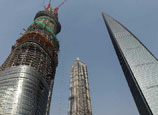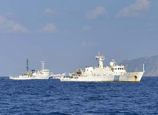
BUCHAREST, Dec. 9 (Xinhua) -- Romania's President Traian Basescu said he was casting his ballot for Romania's continued road towards the West, as parliamentary elections were underway on Sunday.
On leaving a polling station in the capital Bucharest, Basescu said that he did not want his country to remain in "the grey area," stressing that Romania must continue its Euro-Atlantic road.
"Our road certainly goes towards the Euro-Atlantic values, which should be part of our life," he said, while noting "We can be very good friends with Russia and China."
Meanwhile, Chairman of the main opposition Democratic Liberal Party Vasile Blaga said that he voted for a "right Romania, for a Romania of the European Union and a European course of the country."
The Democratic Liberal Party, backed by Basescu, is the senior partner of the Right Romania Alliance, main rival of the ruling Social Liberal Union.
Romanians vote in the parliamentary elections Sunday to elect a new parliament for the next four years, with over 18 million people registered for the vote. Voting began at 7:00 a.m. (0500 GMT) and is to end at 9:00 p.m.
More than 2,400 candidates from 30 parties and 12 independents are running for 315 seats in the Chamber of Deputies and 137 in the Senate, according to the Central Electoral Bureau.
The polls pit the ruling Social Liberal Union, a coalition composed of the Social Democratic Party, the National Liberal Party and the Conservative Party, against the Right Romania Alliance.
Two other parties likely to enter the new parliament are the populist People's Party created by media tycoon Dan Diaconescu and the Hungarian Democratic Union of Romania representing the minority Hungarians.
A party has to pass a 5-percent threshold to win seats in either chamber of the parliament, while in the case of political or electoral alliances, 8 percent for alliances of two parties, 9 percent for three and 10 percent for four or more parties.
The voters are polarized following a change of the majority coalition and appointment of Social Democrat Victor Ponta as prime minister in May.
Local elections in June gave a significant victory to the new ruling coalition which won 36 of the 41 county councils.
Opinion polls suggested an overwhelming win for the ruling coalition.














 Spectacular images of erupting volcanoes
Spectacular images of erupting volcanoes


![]()
